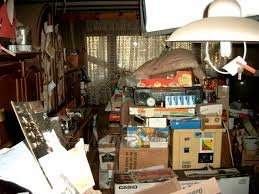In everyday tasks, responsibilities, work and the desire to always arrive on time, it is very easy to accumulate things and leave objects where they do not belong, thus causing a mess that can become uncontrollable if you do not know it. Drive on time. This disorder that you begin to create from a minimum starting point can grow to maximum levels.
Psychological Impact of Cumulative Disorder and How to Address It Effectively
That chaos that grows around you, especially in the place where you live, can wreak havoc on your mind, diminishing the quality of life you may have and bringing that disorder to other aspects of life, such as your work, social, and economic life. , among others. It is necessary to raise awareness of the serious impact of the disorder on your mental health and how it can affect your daily tasks.
What is disorder?
It can be defined as the state of confusion or alteration of something, whether in public spaces, in homes or in one’s own appearance. Some experts claim that when a person begins to be disorderly it is due to various factors such as stress, lack of habit when taking on certain household tasks, apathy, communication problems or even depression. People who suffer from this behavior simply cannot control each action within the “order” such as cleaning and sanitation. Contact us.
The worst enemy of mental health?
Since the pandemic occurred in 2020, people have spent more time at home, therefore, the cumulative index of disorder is broader; so today it is a stressful factor, diminishing the feelings of well-being and harmony in your life. Many people do not realize that clutter has a high impact on their psychology and behavior, even leading them to implement bad waste practices. This can cause diseases such as depression and anxiety.
Tips for organizing life and home
- Create routines: Incorporating daily instructions provides structure and helps reduce chaos. Establish specific moments in your life so that you can develop all your roles efficiently, such as work, rest, and your social life. This way you can keep your spaces organized without feeling exhausted every day and without wasting your time.
- Clear spaces: This way you can clearly see what elements you have in your life and others you can discard. This tip is especially useful to maintain order in your closet (clothes and shoes).
- Use to-do lists: You can keep track of your daily responsibilities. Creating clear goals in your life will help you persevere your objectives in a clearer and simpler way.
- Create zones of order: designate specific areas for different activities. This activity will help you establish the segment of order in your space for a longer time. All spaces in your home must be 100% functional for what they were created for.
- Incorporate breaks: Schedule breaks throughout the day to relax and recharge. In your life, you must clearly establish your facets so that you have a balanced life.
- Learn to delegate: it is not your obligation to have to face everything alone. Delegating tasks in your development spaces will help you achieve a tighter task schedule and thus have better order in your life.
Visit a professional for clutter management
The disorder in our environment can be related to our emotions and mental states. A psychologist or therapist can help you explore the underlying causes of your disorder and provide you with strategies to manage it effectively. It is necessary that you go to a professional, because they will be able to give you the necessary tools to improve and control this behavior. It is important to find a professional that you feel comfortable with and who can adapt to your specific needs.
The disorder cannot be underestimated, because it can lead you to make wrong decisions throughout your life, leading to compulsive hoarding disorder if you do not control it in time or persuade for a long time.

